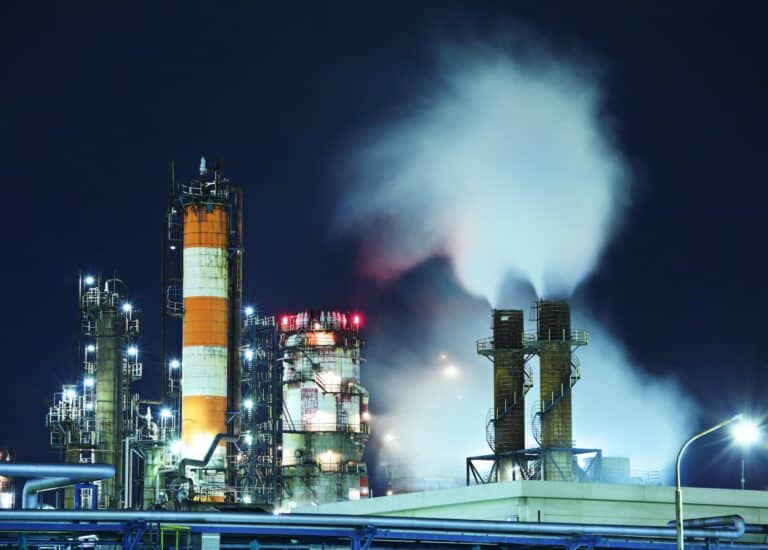With the existing environmental problems, countries strive for clean energy independence to provide economic security and reduce dependence on foreign energy sources. However, as the world faces an ever-growing climate crisis, it’s not always easy to balance the priorities of energy independence and environmental protection.
By promoting renewable energy resource development, energy-efficient technologies, and sustainable practices, we can achieve energy independence and environmental protection.
Main Environmental Concerns
The production and use of fossil fuels have been under scrutiny for their significant environmental impacts. These impacts are increasingly recognized as threatening public health, environmental sustainability, and economic development.
Air Pollution
Power plants are one of the main contributors to air pollution, as they emit pollutants that negatively affect the Earth’s climate and air quality. Emissions from power plants can include sulfur dioxide, nitrogen oxides, particulate matter, and greenhouse gases.
The U.S. Environmental Protection Agency (EPA) regulates public exposure to these emissions to protect human health. They also set standards for emissions from power plants and other pollution sources and enforce these standards through monitoring and other measures.
Residential pollution sources can also contribute significantly to poor air quality. These sources can include tobacco smoke, household cleaners, and mold. Poor indoor air quality can have a negative impact on human health, causing respiratory problems, headaches, and fatigue.
Water Pollution
With far-reaching impacts on human health and ecosystems, over 300 million Americans are estimated to obtain their drinking water from sources contaminated by pollutants such as chemicals, pesticides, and bacteria.
Industrial pollution, agricultural runoff, and urban stormwater runoff threaten rivers, lakes, and reservoirs. This widespread pollution risks aquatic life and can disrupt the delicate balance of ecosystems.
Habitat Destruction
Power plants, in particular, are known for their negative impacts on habitats. They contribute to the decline of plant species in wetlands, the reduction of biodiversity, and the overall loss of wildlife habitats. Human activities such as agriculture lead to deforestation and degradation.
Renewable energy sources aren’t immune to these problems. While they offer cleaner alternatives to traditional energy sources, some renewable energy projects can still result in habitat loss and stress on wildlife populations.
Climate Change
Burning fossil fuels, deforestation, and other human activities have released large amounts of greenhouse gasses into the atmosphere, trapping heat and raising the planet’s temperature. This warming has resulted in rising sea levels, more frequent and severe weather events, and changes in ecosystems and animal populations.
As the world’s largest oil and gas producer, the United States is directly linked to the negative impacts of climate change. Our dependence on fossil fuels and associated greenhouse gas emissions have only worsened the pressing global warming issue.
Climate change exacerbates social, environmental, and economic risks and directly impacts mental health and well-being. Rising temperatures and more frequent and severe weather events can lead to displacement, food and water insecurity, and increased disease risk. Climate change can also exacerbate inequities, particularly for vulnerable populations such as low-income communities, indigenous peoples, and people of color.
Understanding Clean Energy
Clean energy is produced from renewable sources with little to no negative environmental impact. Unlike traditional energy sources, such as fossil fuels, clean energy sources don’t produce harmful emissions contributing to climate change or air pollution.
Why Clean Energy Matters
By harnessing energy sources such as solar and wind power, renewable energy minimizes greenhouse gas emissions and contributes to the fight against climate change. These forms of energy aren’t only environmentally friendly but also economically viable and increasingly affordable compared to traditional fossil fuels such as coal, oil, and gas.
The International Energy Agency (IEA) highlights the role of clean energy in ensuring reliable access to diverse energy sources—a key factor in strengthening security on a global scale. Additionally, the IPCC Special Report recognizes that shifting to renewable resources is an important step toward a sustainable future while significantly reducing our carbon footprint.
The Importance Of Energy Independence
Energy independence is a country’s ability to produce enough energy to meet its own needs without relying on imports from other countries. It can be achieved by using renewable energy sources or by increasing domestic production of fossil fuels like oil and natural gas.
Achieving energy independence requires a concerted effort across government, industry, and society to develop and invest in domestic energy sources. This includes promoting the development of renewable energy sources, increasing domestic production of fossil fuels, and improving energy efficiency to reduce overall energy demand.
Leading Renewable Energy Sources
Each of these clean energy sources has its own benefits and challenges, but common to all is the goal of producing energy with little or no negative environmental impact. The main renewable energy sources include:
- Solar energy is derived from the sun’s rays and captured by solar panels.
- Wind energy is derived from the energy of the wind and captured by wind turbines.
- Hydroelectric power is obtained from the energy of flowing water and captured by turbines. It’s environmentally friendly and can be obtained from various sources such as rivers, streams, and ocean tides.
- Geothermal energy comes from the heat of the Earth’s core and is used by geothermal power plants.
- Bioenergy is produced from organic matter such as plants and animal waste and is obtained through biomass, biofuels, and biogas.
Strategies For Achieving Energy Independence Amid Environmental Concerns
The Biden-Harris Administration’s climate legislation has further strengthened U.S. energy independence and security. The Bipartisan Infrastructure Law and the Inflation Reduction Act have supported energy reliability, cleaner production, and investment in U.S. clean energy production. As we move toward a future where energy independence and environmental protection are intertwined, these strategies will play a pivotal role in shaping our world.
Promoting Clean Energy Technologies
Investing in clean energy technologies meets the growing demand for environmentally friendly solutions and provides significant economic opportunities. According to President Biden’s budget FY 2023, prioritizing clean energy development will help lower overall energy costs while addressing the urgent need to combat the climate crisis and promote environmental justice.
Additionally, market trends show that Americans have a strong interest in renewable energy sources. Switching to clean energy promotes our nation’s economic growth and helps reduce dependence on foreign oil and fossil fuels.
Clean energy technologies will also create new jobs to assist in manufacturing, installing, and maintaining the systems. This provides economic opportunities and helps promote environmental justice by bringing clean energy jobs to communities that have been disproportionately impacted by pollution and climate change.
Regulation And Policy Measures
Governments need to implement policies that promote the development and use of renewable energy sources, increase energy efficiency, and support the development of new technologies. These policies can help create a regulatory environment that encourages adopting sustainable energy practices and fosters innovation. While the U.S. has already made numerous strides to combat environmental concerns to make up for decades of pollution creation, the world still has ways to reach clean energy independence.
The Environmental Protection Agency (EPA) is responsible for enforcing federal environmental laws, including the Clean Air Act, which aims to reduce air pollution and protect public health, as well as the Clean Water Act, which regulates the discharge of pollutants into the nation’s waters and protects wetlands and fisheries. These laws and regulations are regularly reviewed and updated to ensure they remain effective and relevant in the face of new challenges.
In recent years, there’s been an increased emphasis on renewable energy production in the United States. The Outer Continental Shelf Lands Act provides a framework for offshore energy development while ensuring the protection of the marine environment. Renewable energy portfolios are also being implemented at the state level, which requires utility companies to generate a certain percentage of their energy from renewable sources such as wind and solar.
The U.S. Department of Transportation provides support and policy advice on energy and transportation initiatives to ensure a sustainable environment. The department conducts research and development to advance energy-efficient transportation technologies such as electric vehicles and alternative fuels.
Challenges In Achieving Energy Independence
Achieving energy independence is a complex task that requires a multifaceted approach. But by addressing its challenges, we can work towards a more sustainable future for generations.
Dependence On Foreign Oil And Fossil Fuels
The United States imports significant oil from other countries, leaving us vulnerable to geopolitical tensions and price volatility in the global marketplace. Our reliance on imported oil has negative environmental consequences due to the emissions produced from the transportation and refining of oil.
Reducing our dependence on foreign oil and fossil fuels can help us promote energy independence while protecting the environment and promoting economic and social benefits.
High Cost Of Renewable Energy Technologies
The cost of renewable energy sources such as solar and wind power has been steadily decreasing, but they still require significant investments in infrastructure and technology. The initial investment in renewable energy infrastructure can be significant, and it can take several years to see a return on investment. This can make it difficult for individuals and businesses to justify the upfront costs of investing in renewable energy, especially in the short term.
However, the long-term benefits of renewable energy sources far outweigh the initial costs. Renewable energy sources provide a reliable and sustainable source of energy that isn’t subject to price fluctuations or geopolitical tensions.
Lack Of Infrastructure For Renewable Energy
Unlike traditional sources, renewable energy sources are often widely dispersed and require significant transmission and distribution infrastructure investment. Renewable energy sources are usually located in remote areas such as deserts, offshore locations, or mountainous regions far from the areas where the energy is needed. As a result, renewable energy infrastructure requires a significant amount of investment in transmission and distribution infrastructure to transport the energy to where it’s needed.
Transmission and distribution infrastructure should be designed to accommodate the variability of renewable energy sources, such as solar and wind energy fluctuations. This requires the development of advanced energy storage technologies and smart grid systems that can effectively manage the fluctuations of renewable energy sources and provide a stable supply of energy to consumers.
Silver’s Role In America’s Drive To Energy Independence
Silver is highly conductive, meaning it can conduct electricity efficiently. Its high conductivity makes it an ideal material for the conductive wires and contacts that transmit electricity from photovoltaic solar cells to the power grid. Silver’s high conductivity allows for more efficient power transmission, resulting in more effective solar panels and greater energy independence.
The use of silver in solar module manufacturing has increased dramatically in recent years as solar energy has become more affordable and accessible. According to the Silver Institute, the use of silver in solar module production increased by over 35% between 2016 and 2018 alone.
The use of silver in other renewable energy technologies, such as fuel cells and batteries, is also expected to increase. It’s used as a catalyst in fuel cells, which convert hydrogen and oxygen into electricity and is also used in batteries, where it improves conductivity and increases battery performance.
As America seeks to reduce its dependence on imported oil and switch to renewable energy sources, demand for silver in the energy industry is expected to increase. According to the Silver Institute, demand for silver in the solar industry is expected to grow by more than 50% over the next decade. This growth will be driven by the increasing use of solar energy as a reliable and sustainable energy source.
Diversify Your Portfolio With Precious Metals
As America strives towards energy independence, investing in silver and other precious metals is becoming attractive for investors looking to take advantage of the market before prices skyrocket. These metals hedge against inflation and currency devaluation, making them a reliable store of value during turbulent market times.
Whether you’re interested in purchasing physical metals or looking to invest directly in an SDIRA, Noble Gold Investments can guide you through the process, answer any questions, and give you peace of mind that your retirement portfolio is protected. Call us at 877) 646-5347 or click here to open an account today.







